

WWOOF Association. Mulch Type To Use Depends On Plantings, Location. By DEAN FOSDICK - The Associated Press Arborist chips, a back to nature mulch in Langley, Wash.
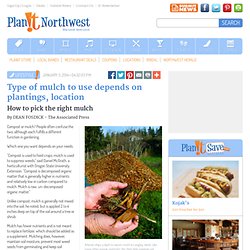
Like many other organic materials, the chips help maintain soil moisture, prevent weeds from sprouting and keeps soil temperatures relatively constant around plants. 7 Natural Uses For Baking Soda In The Garden. Share Baking soda is a vital part of green cleaning and has so many uses in the house, but what about the garden.
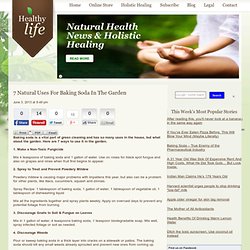
Here are 7 ways to use it in the garden. At Least 10 Uses For Wood Ash. 1 - Dust Baths - place cold ashes where your birds can get to them, the dust baths will control bugs 2 - Ring Around the Rosie - spread a low ring around individual plants are gardens to deter slugs/snails 3 - Mix into your Compost - in the north, this is the perfect thing!
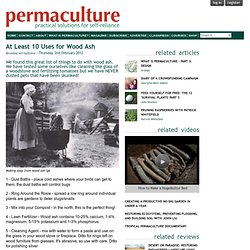
Homemade Weed Killer – Make Your Own Weed Killer. So we've taken care of the bug problem in our gardens, but what about weeds?
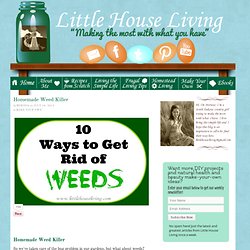
They can be just as much of a terror as the little creepy crawlies. No matter if you have a full blown garden or just a patch of grass-weeds can creep in and mess it all up. Here are some tried and trued at-home remedies for homemade weed killer that can help battle these green monsters. 1. Vinegar. Gardening With Vinegar. Vinegar Uses and Vinegar Tips: Gardening with VinegarAuthor: Kathryn Bax - Website Owner and Developer of Country Living and Farm Lifestyles Vinegar has many uses and benefits and best of all, it is safe to use, doesn't harm the environment, is freely available and it is cheap!

The 7 Deadly Homemade Weed Killers. “And the weeds of the garden shall be visited upon the gardener.”
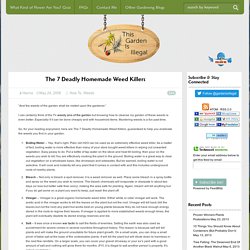
I can certainly think of the 7+ weedy sins of the garden but knowing how to cleanse my garden of these weeds is even better. Especially if it can be done cheaply and with household items. Murdering weeds is a fun past time. So, for your reading enjoyment, here are The 7 Deadly Homemade Weed Killers, guaranteed to help you eradicate the weeds you find in your garden. Top 10 Most Dangerous Plants in the World. 1. Most likely to eat a rat Giant Pitcher Plant: Nepenthes attenboroughii Discovered more than 5000 feet above sea level on Mount Victoria in the Philippines, the giant, carnivorous pitcher plant secretes a nectar-like substance to lure unsuspecting prey into a pool of enzymes and acid.
A series of sticky, downward ribs makes it nearly impossible for trapped prey to escape. The plant's 30-centimeter diameter is large enough to trap unlucky rodents, but insects are its most common meal. 2. Castor Bean Plant: Ricinus communis Castor-bean plants can be purchased at just about any garden center, despite containing the deadly poison ricin. Pesticide Free Lawns Coalition.
Homemade Bug Spray for Gardens - Homemade Bug Spray. Since Spring finally decided to stop being on vacation and show up this year many are finally being able to plant those beautiful and yummy gardens!
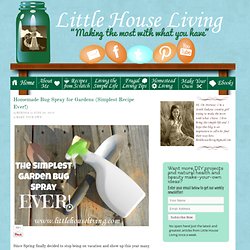
Using Milk As A Natural, Homemade Pesticide. Spraying your plants with milk won't drive bugs away from your garden, but the dairy product can be used to culture Bacillus thuriugiensis Berliner, a well-known bacterial pesticide sold under such brand names as Dipel, Thuricide and Biotrol.
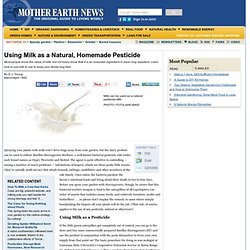
The agent is quite effective in controlling — among a number of insect problems — infestations of loopers, which are those pesky little worms (they're actually moth larvae) that attack broccoli, cabbage, cauliflower and other members of the cole family. Once eaten, the bacteria paralyze the larvae's intestinal tracts and bring about their death in two to four days.Before you spray your garden with thuringiensis, though, be aware that this bacterial-warfare weapon is fatal to the caterpillars of all Lepidoptera (an order of insects that includes many lovely, and relatively harmless, moths and butterflies) . . . so please don't employ the remedy in cases where simply handpicking the loopers off your plants will do the job.
Vegetable Garden Guide: Dealing with Pests and Problems - Martha Stewart. LivingWithBugs: Least-Toxic, Eco-Friendly DIY Pest Control. 75 Things You Can Compost, But Thought You Couldn't - Planet Green. Natural Lawn Care. 82 Sustainable Gardening Tips - Organic Gardening. Most gardeners have sustainability on their minds.
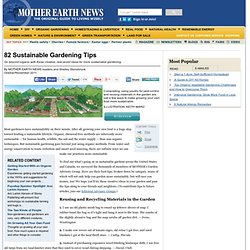
After all, growing your own food is a huge step toward leading a sustainable lifestyle. Organic, chemical-free methods are inherently more sustainable — for human health, wildlife, the soil and the water supply — than non-organic techniques. But sustainable gardening goes beyond just using organic methods. From water and energy conservation to waste reduction and smart seed-sourcing, there are infinite ways we can make our practices more sustainable. To find out what’s going on in sustainable gardens across the United States and Canada, we surveyed the thousands of members of MOTHER’s Garden Advisory Group. Reusing and Recycling Materials in the Garden 1. 2. 3. 4. 5. 6. 7. 8. 9. 10. Urban Organic Gardener: Simple Tips To Grow Your Own Food.